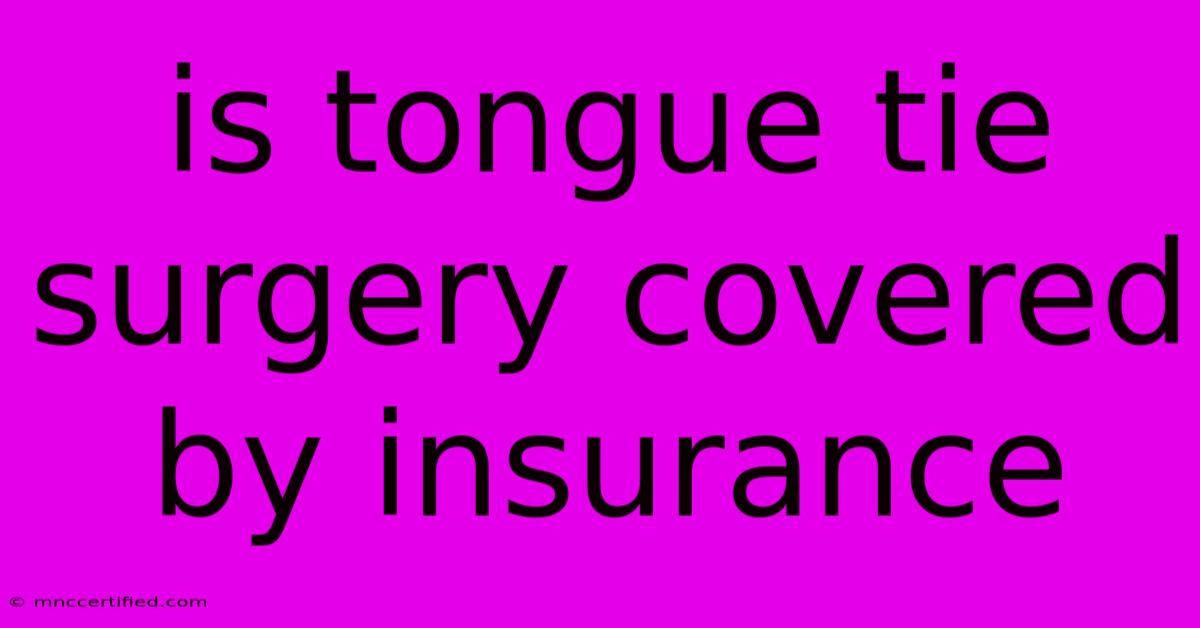Is Tongue Tie Surgery Covered By Insurance

Table of Contents
Is Tongue Tie Surgery Covered by Insurance? A Comprehensive Guide
Tongue tie, also known as ankyloglossia, is a condition where the lingual frenulum, the membrane connecting the underside of the tongue to the floor of the mouth, is too short or tight. This can affect breastfeeding, speech development, and oral hygiene. If you're considering tongue tie surgery for yourself or your child, a key question that arises is: Will insurance cover the procedure?
The answer, unfortunately, is not straightforward. Insurance coverage for tongue tie surgery varies widely depending on several factors, including:
- Your insurance plan: Different insurance companies have different policies regarding coverage for this procedure.
- The type of procedure: There are different techniques for tongue tie surgery, and some may be more likely to be covered than others.
- The reason for the surgery: If the surgery is deemed medically necessary, such as for breastfeeding difficulties or speech impediments, insurance coverage is more likely.
- Your location: State regulations can influence insurance coverage.
Understanding Insurance Coverage for Tongue Tie Surgery
1. Medical Necessity:
The most important factor determining coverage is whether the procedure is deemed medically necessary. This requires a diagnosis by a qualified healthcare professional, such as a pediatrician, dentist, or speech therapist. The doctor must document the condition's impact on your health, such as:
- Breastfeeding difficulties: Tongue tie can make breastfeeding painful or ineffective, leading to insufficient weight gain and other complications.
- Speech problems: A tight frenulum can interfere with tongue movement, affecting articulation and clarity.
- Oral hygiene issues: Tongue tie can make it difficult to clean the tongue, leading to bad breath and dental problems.
2. Pre-Authorization:
Even if your insurance plan covers tongue tie surgery, you might need to obtain pre-authorization from your insurance provider before the procedure. This involves submitting medical records and obtaining approval for the surgery.
3. Out-of-Pocket Costs:
Even with insurance coverage, you may still be responsible for some out-of-pocket costs, such as:
- Co-pays: These are fixed amounts you pay for each medical visit or procedure.
- Deductibles: This is the amount you need to pay before insurance coverage kicks in.
- Co-insurance: This is a percentage of the costs that you pay after your deductible is met.
What to Do if Your Insurance Doesn't Cover Tongue Tie Surgery
If your insurance plan doesn't cover tongue tie surgery, consider these options:
- Appeal the decision: You can appeal your insurance company's decision if you believe it was made in error.
- Explore alternative financing options: You may be able to access financing through personal loans, credit cards, or health savings accounts.
- Seek out discounted or sliding-scale clinics: Some clinics offer discounted services for individuals with limited financial resources.
Tips for Maximizing Your Chances of Insurance Coverage
- Choose a qualified healthcare provider: Get a diagnosis from a physician who specializes in tongue tie treatment.
- Document the condition: Keep detailed records of your child's breastfeeding difficulties, speech problems, or other issues related to tongue tie.
- Obtain pre-authorization: If your insurance requires pre-authorization, submit the necessary documentation well in advance of the surgery.
- Negotiate with your insurance provider: Don't hesitate to negotiate with your insurer to see if they can provide coverage for the procedure.
Conclusion
Insurance coverage for tongue tie surgery can be complicated. Understanding your plan's coverage, documenting the medical necessity of the procedure, and advocating for yourself are crucial steps in maximizing your chances of coverage. While navigating the insurance system can be challenging, seeking the necessary care for tongue tie is important for a child's overall health and well-being.

Thank you for visiting our website wich cover about Is Tongue Tie Surgery Covered By Insurance. We hope the information provided has been useful to you. Feel free to contact us if you have any questions or need further assistance. See you next time and dont miss to bookmark.
Featured Posts
-
Project 2025 Trumps Distance Explained
Nov 07, 2024
-
Media And Entertainment Investment Banking
Nov 07, 2024
-
Trumps White House Visit Boosts Dogecoin 25
Nov 07, 2024
-
Trump Victory Sparks Bitcoin Price Rally
Nov 07, 2024
-
California Crime Bill Prop 36 And Theft
Nov 07, 2024